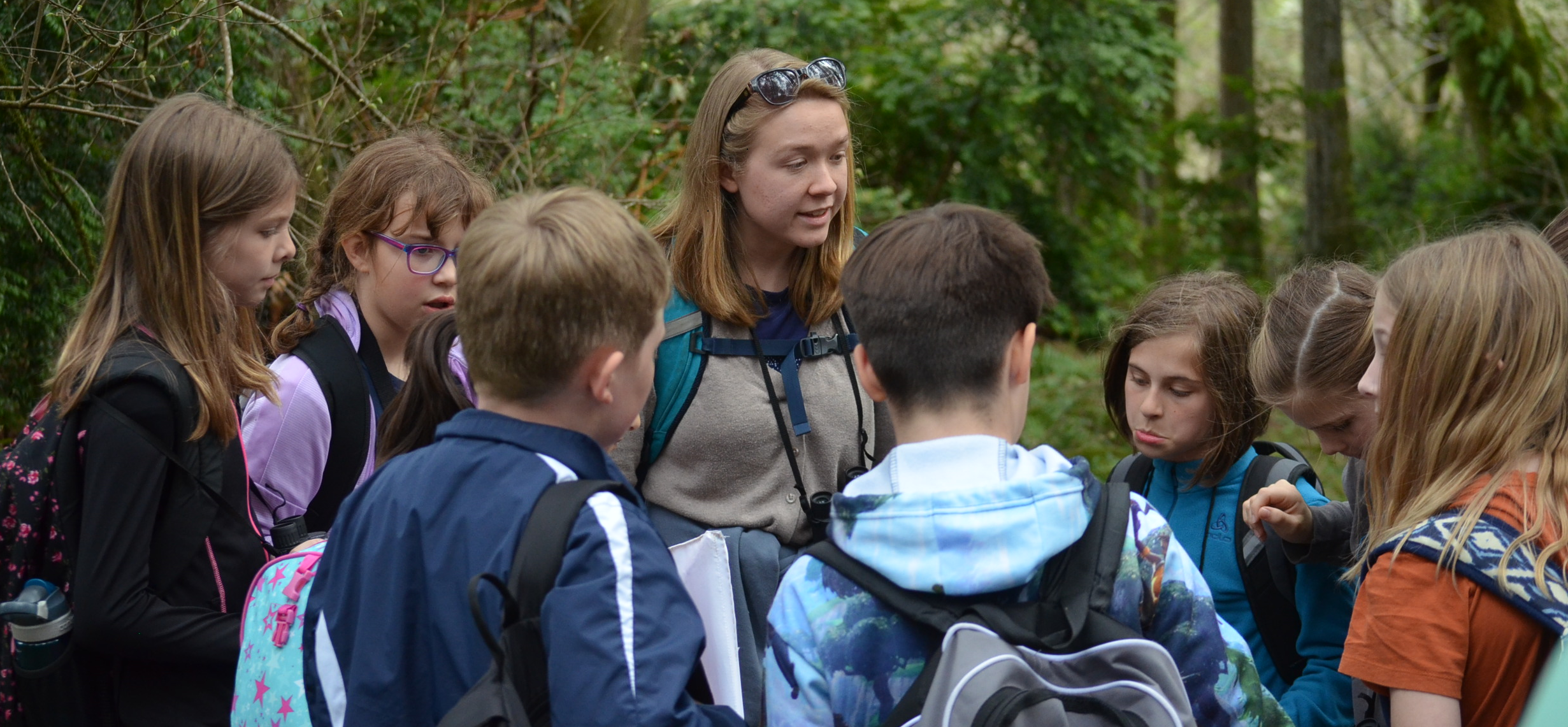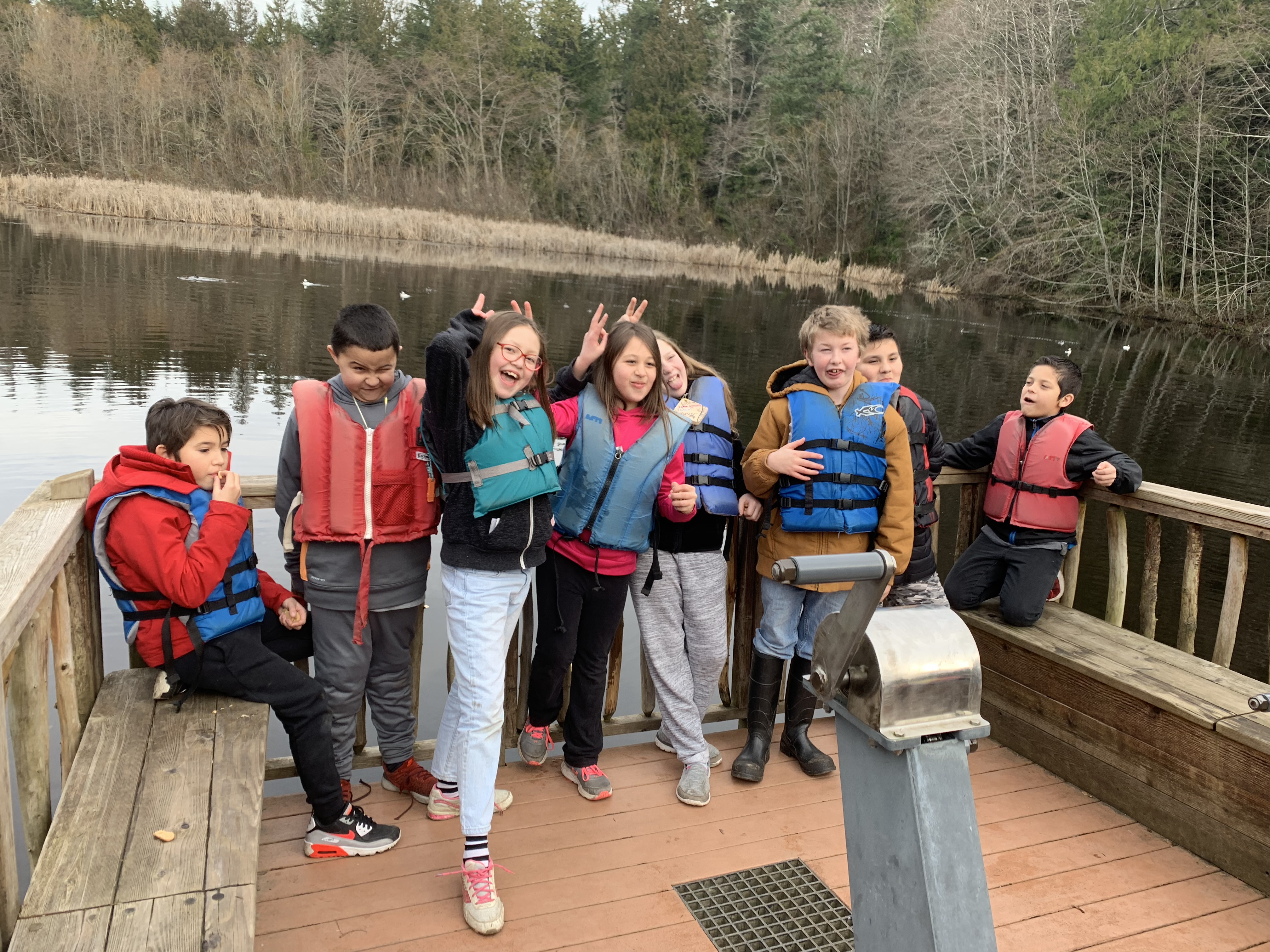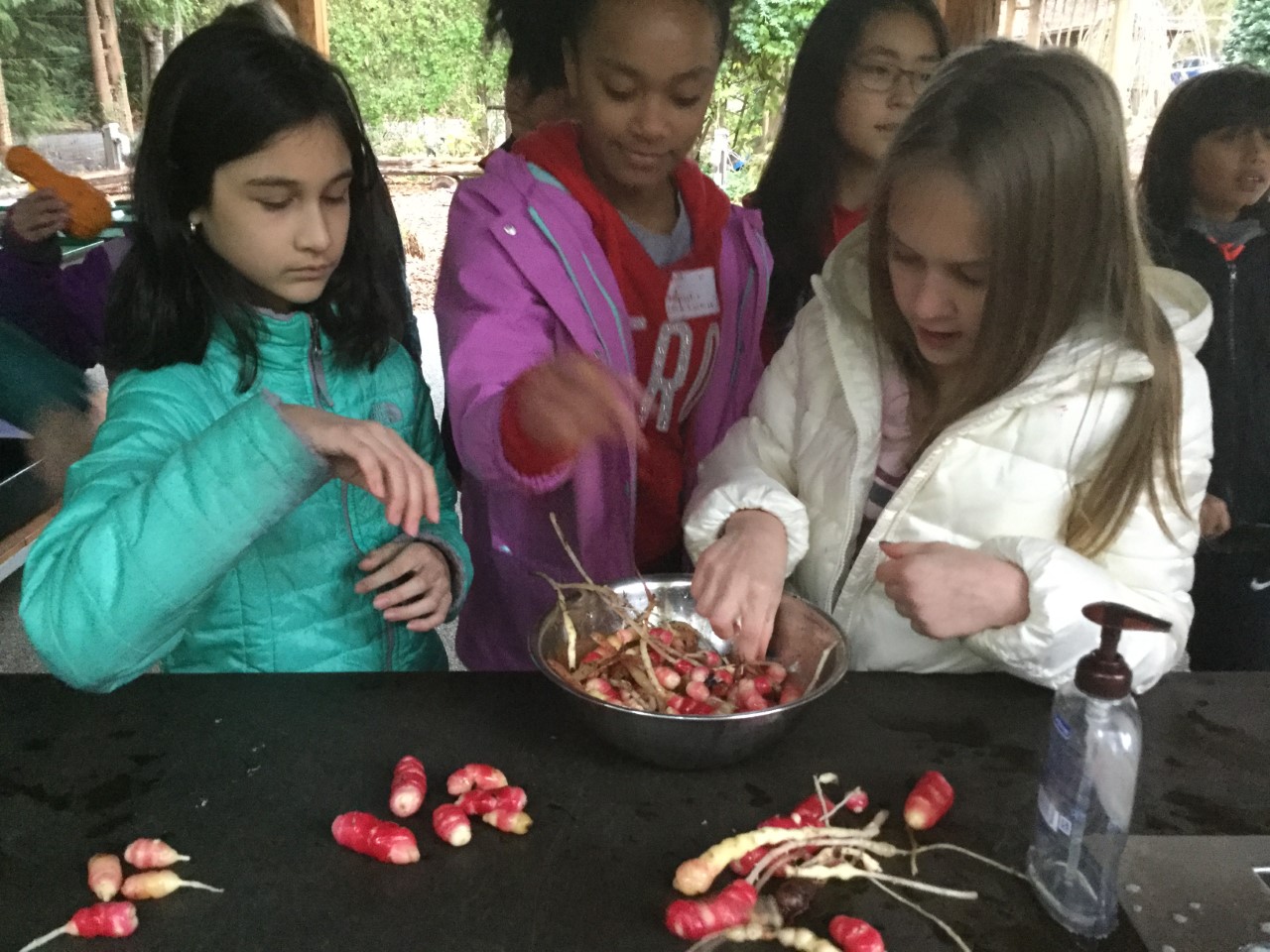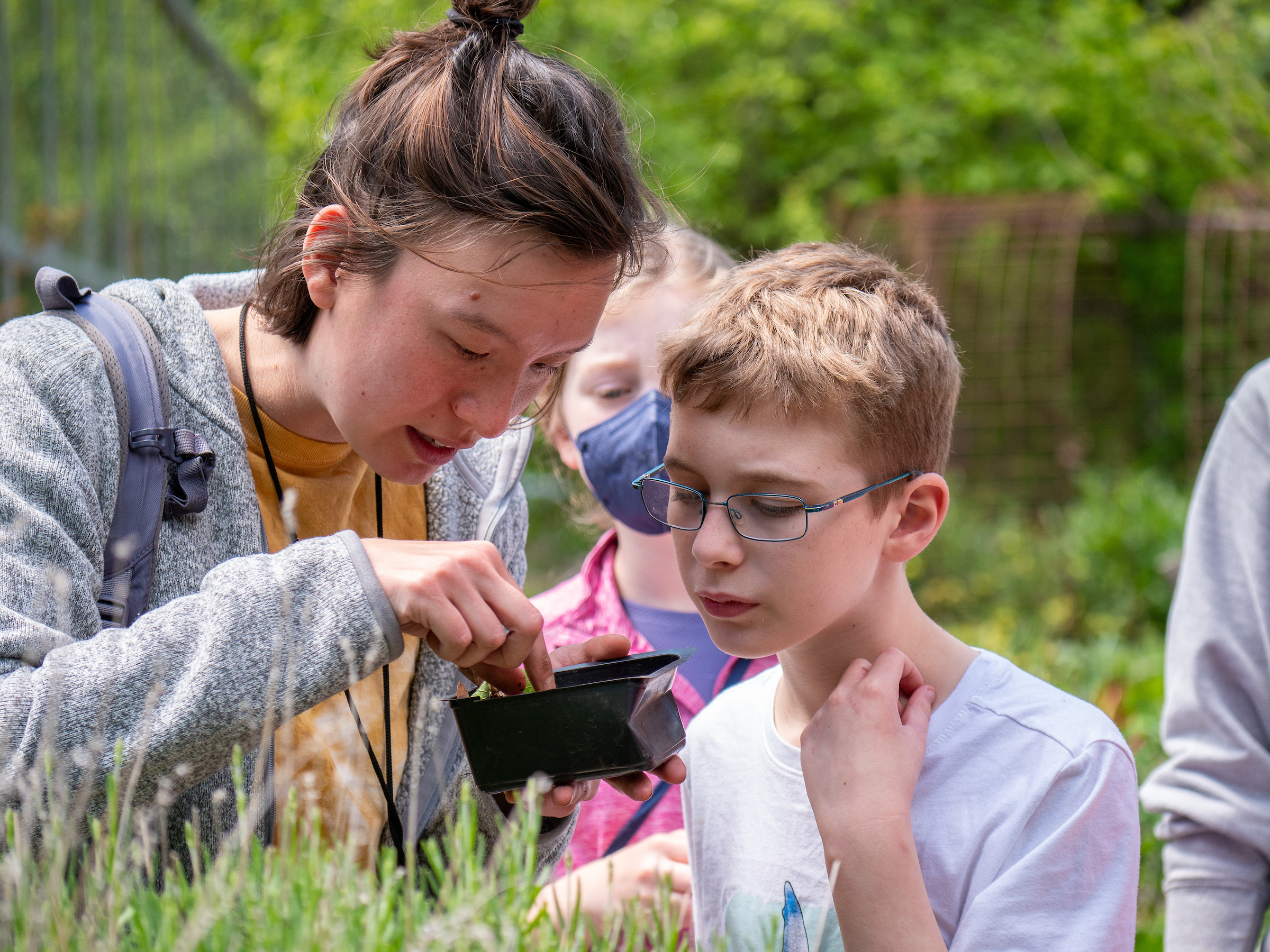We're excited to introduce Moment of Discovery, a new blog series in which graduate students,…
Nancyrose Houston attended the School Overnight Program with Bryant Elementary sixteen years ago. Since then, she has earned her teaching certificate, spent a year doing field education and research in the southernmost city in the world, and started an environmental education program at her childhood summer camp, Sound View. We caught up with Nancyrose to learn about her path to becoming an environmental educator, and why she’s so passionate about giving students access to place-based education.
You attended IslandWood’s School Overnight Program with Bryant Elementary in 2003. What do you remember from your time here?
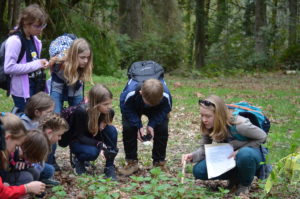
Nancyrose Houston teaching a group of campers in the woods at Sound View.
IslandWood was a really formative moment for me. I actually came back with my dad a little less than a year ago for [Afternoon on the Trails], and we had a great time visiting. When I saw the buildings, memories started to come back. [IslandWood] gives the opportunity for kids to learn and experience new things that they’ve never seen before and never thought about before, and to experience passionate people who get kids excited about learning about the environment.
What have you been up to since your time at IslandWood?
In middle school and high school, I wasn’t super interested in biology, mostly because of the way it was taught, so for me I didn’t feel as much of a connection to the things I loved. It wasn’t so fun to learn about cells and photosynthesis in the classroom.
When I went to college I ended up studying Social Sciences, and I got my teaching certificate. I knew that I wanted to go into the education field in some way. When I graduated from college, I got a fellowship to travel in Patagonia for a semester. I wanted to work with an organization that was involved directly in the community, so I decided to travel through southern Chile and Argentina and find an organization that I liked. I traveled for two months, and eventually got to this little town called Puerto Williams, which is the southernmost city in the world. It only has 2,000 people, but it’s on an island the size of Rhode Island. I got involved with the Sub-Antarctic Biocultural Conservation Program, and they do conservation work, research, biological and cultural ecology research.
My love for biology was reignited when I went to Chile. Living and working with the researchers there was this incredible immersion – similar to the immersion experience of a kid going to an outdoor camp. An immersion experience, adult-style. I worked with an ornithologist and with researchers studying freshwater ecosystems, plants, macroinvertebrates, invasive species. That really immersed me in biology and ecology, and I grew to love it again and remember why I’d loved it as a kid.
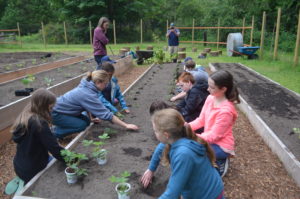
Nancyrose gardening with campers at Sound View.
With that organization, I learned a lot about field science education. On that island there are only six species of trees. The only mammals that are native to the island are a few species of mice, a few species of bat, and the Guanaco, which is like a llama. There are no amphibians, no reptiles. A lot of birds and a lot of mosses and lichens. It’s a very different reality than many places, so the program focuses on “What do we have here? Let’s learn about the biodiversity here.”
I saw how important it was in kids’ lives, getting them excited about where they live and starting to get them to look at and care about and love these creatures that might get overlooked otherwise.
Can you tell us about your current position as Environmental Education Director at Sound View Camp?
It’s been a whirlwind of a year at Sound View, since we inaugurated our Outdoor Environmental Education (OEE) program in March of 2018. The camp has been around since the 1980s, but our OEE program is new. I started coming here when I was eleven. I was a camper, a leader in training, and then a summer camp counselor for three years. When I came on [as a staff member] in March, I had to basically start the [Environmental Education] program from scratch.
The exciting thing that’s happening right now is that we had enough schools sign up this spring for me to hire a live-in staff for the first time. I’m thrilled to pass on some of the leading of the classes to other people and be able to observe them, and actually step into a role as Environmental Education Director, rather than leading many of the classes.
We’ve connected with a local group that’s out of Gig Harbor called Harbor Wild Watch, who do biodiversity modeling at the harbor at low tide. I started volunteering with them, because I thought it would be a good opportunity to learn more, and they got us set up as a beach monitoring site. I had my birthday party at camp, and we did beach monitoring at night at the lowest tide in January, which was super fun! We’ll do it once in winter and once in summer, during the summer camp. I’m excited to get kids involved in that. That’s one thing where you can tell them, “We’re actually going to submit this, and this will go to a database where people are studying the health of Puget Sound through the data we’re collecting.”
What are your goals for the OEE program at Sound View?
My goal right now is to get the learning deeper, to get kids to ask questions, notice things, make observations, use evidence to make explanations.
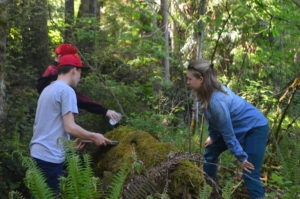
Nancyrose examining a log in the forest with campers.
I want to be able to visit schools before they come to camp to weave the experience into the classroom more, like IslandWood does. That’s one of my goals – to have [Sound View] be a tool that teachers can use to further their curriculum goals, and not just as a field trip.
I don’t remember all the content that I learned [at IslandWood], but it’s not really about content. It’s about getting kids excited about being in nature, and seeing new things so that they can go home and notice those things there as well, whether they grew up in the city or the country. One of my big goals for Sound View [is] having more nature-based activities that get kids asking questions and observing. [At Sound View] kids are in nature all the time, but we need to also give them the tools to look at nature in a different way.
This interview has been condensed and edited for clarity.

